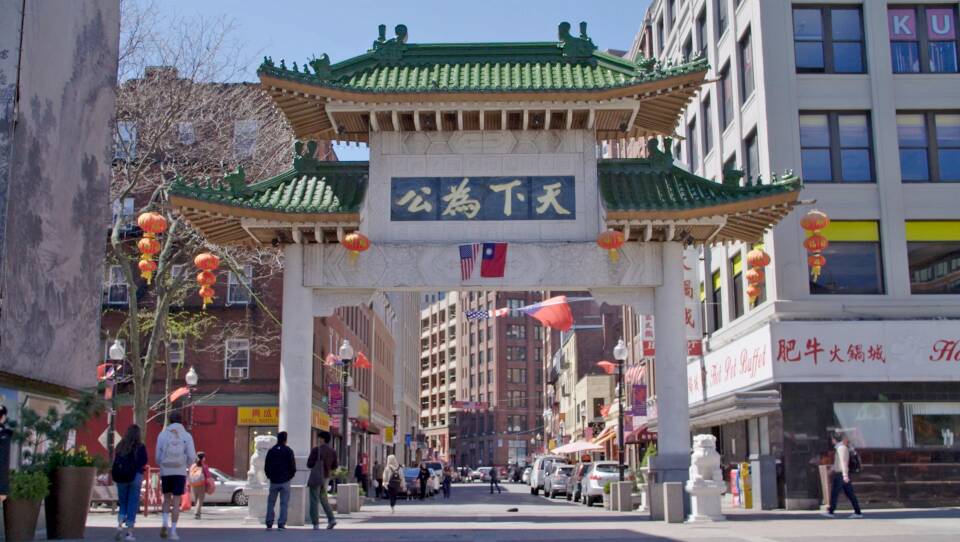When Boston lawyer Paul Lee reflects on his childhood in Boston’s Chinatown, he remembers the “intimate, almost village-type atmosphere” of Hudson Street and the old Quincy School.

“It was the kind of neighborhood where you walked outside and started whistling and other kids would come down,” he says. “We’d play in the streets and the mothers would be watching out of the windows to supervise.” The recollections of Lee, a GBH trustee, are part of A Tale of Three Chinatowns, which premieres on Friday, May 27 on GBH WORLD’s Local, USA. The film tells the story of Chinatowns in Boston, Chicago and Washington, D.C., and explores the survival of urban ethnic neighborhoods. In Chicago’s Chinatown, the Asian American population has increased, and its borders have expanded. In contrast, Washington, D.C.’s Chinatown has dwindled to about 300 residents of Chinese descent. Boston’s Chinatown neighborhood finds itself somewhere in between these two extremes as various groups fight for the land on which it sits. Learn more about the film here.
“Boston’s Chinatown is still where it was originally — bordering the Financial District, Downtown, South Station and several lines of the T,” says Lee, a GBH Trustee since 2017. “It has become a desirable area to live again. But with a lot of luxury apartment buildings being built, gentrification is a real threat to Chinatown.”
Telling the stories of residents, community activists, developers, government officials and people who have a connection to these special neighborhoods is important, especially now, say the filmmakers. “There’s not any real preservation of our history,” said Penny Lee, co-producer with Lisa Mao. “If we don’t share this with our children and grandchildren, or even among ourselves, it’s going to get lost and forgotten.”
Lee, whose family moved out of Chinatown to Brookline when he was 11, went on to work as a corporate lawyer. He was a founder of the Asian American Lawyers Association of Massachusetts and served as past president of the national Asian Pacific American Bar Association. All along, he has maintained a close allegiance and sense of responsibility to preserve Boston’s Chinatown.
“I feel a connection to Chinatown. Having all of the social and cultural services there was really critical to my parents when they first came to the U.S. Neither of them spoke English — my father came when he was 13 and then my mother came when they married. Having the family associations and the social networks helped them get jobs and provided support.”
Lee has been active at the South Cove Community Health Center, Asian Task Force Against Domestic Violence and helped found the Asian Community Development Corporation, which has worked to build and protect several affordable housing projects.
“With gentrification happening all around us, these housing projects are important anchors because they are permanently affordable,” he says. “We can hold on to them to provide affordable housing for our residents and try to build more from there.”
“I think the film does an excellent job of illuminating the dynamics that are challenging the different Chinatowns,” he adds. “You can see from the history of the Chinatowns that have not survived that it's a hard fight.”
But he’s optimistic about the Boston neighborhood’s future.
“There’s a whole new generation of activists — and I'm not just talking about my generation. There’s a younger generation that has come back to Chinatown. They are throwing themselves into organizing folks in the community to advocate for residents’ needs and rights,” he says.
Join co-producers Lee and Mao and AAPI leaders on May 12 for a special GBH event (in-person and virtual) that focuses on the rich past and uncertain future of local and regional Asian American and Pacific Islander neighborhoods. Register here.
Explore a new archival collection on AAPI topics from the American Archive of Public Broadcasting (AAPB) here. AAPB is a collaboration between our own GBH Media Library and Archives and the Library of Congress.
Check out another GBH collection of films and resources that commemorate Asian American and Pacific Islander Heritage Month.



